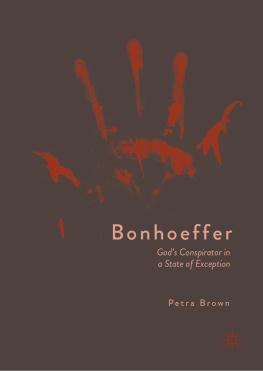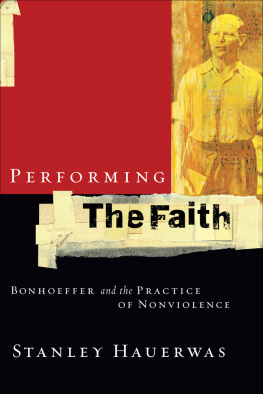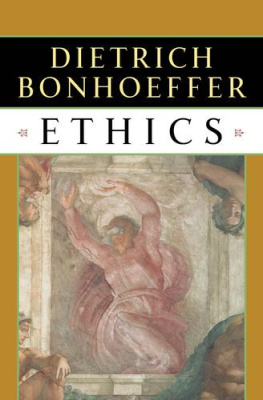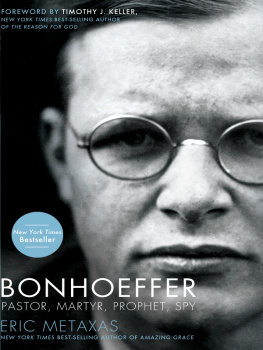Petra Brown - Bonhoeffer: God’s Conspirator in a State of Exception
Here you can read online Petra Brown - Bonhoeffer: God’s Conspirator in a State of Exception full text of the book (entire story) in english for free. Download pdf and epub, get meaning, cover and reviews about this ebook. year: 2019, publisher: Springer International Publishing, genre: Politics. Description of the work, (preface) as well as reviews are available. Best literature library LitArk.com created for fans of good reading and offers a wide selection of genres:
Romance novel
Science fiction
Adventure
Detective
Science
History
Home and family
Prose
Art
Politics
Computer
Non-fiction
Religion
Business
Children
Humor
Choose a favorite category and find really read worthwhile books. Enjoy immersion in the world of imagination, feel the emotions of the characters or learn something new for yourself, make an fascinating discovery.
- Book:Bonhoeffer: God’s Conspirator in a State of Exception
- Author:
- Publisher:Springer International Publishing
- Genre:
- Year:2019
- Rating:5 / 5
- Favourites:Add to favourites
- Your mark:
- 100
- 1
- 2
- 3
- 4
- 5
Bonhoeffer: God’s Conspirator in a State of Exception: summary, description and annotation
We offer to read an annotation, description, summary or preface (depends on what the author of the book "Bonhoeffer: God’s Conspirator in a State of Exception" wrote himself). If you haven't found the necessary information about the book — write in the comments, we will try to find it.
Petra Brown: author's other books
Who wrote Bonhoeffer: God’s Conspirator in a State of Exception? Find out the surname, the name of the author of the book and a list of all author's works by series.
Bonhoeffer: God’s Conspirator in a State of Exception — read online for free the complete book (whole text) full work
Below is the text of the book, divided by pages. System saving the place of the last page read, allows you to conveniently read the book "Bonhoeffer: God’s Conspirator in a State of Exception" online for free, without having to search again every time where you left off. Put a bookmark, and you can go to the page where you finished reading at any time.
Font size:
Interval:
Bookmark:
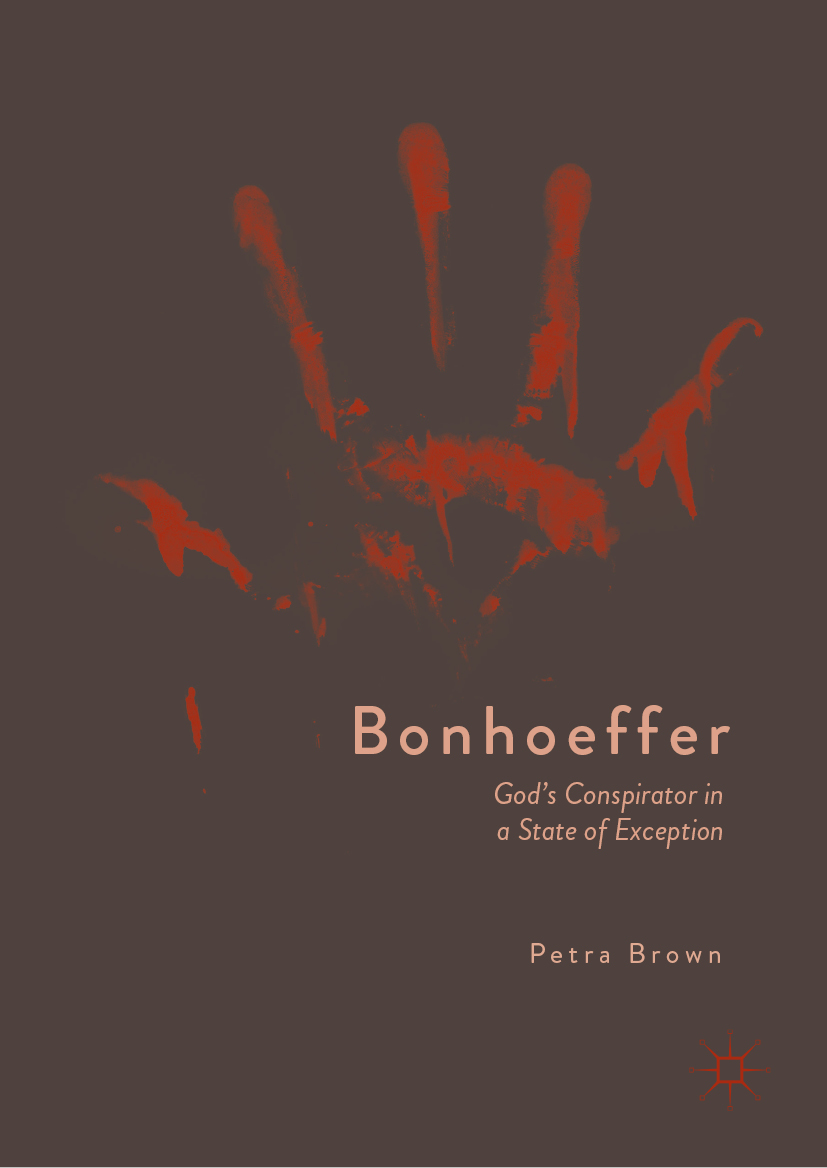

Cover credit: NYstudio/Getty Images
This Palgrave Macmillan imprint is published by the registered company Springer Nature Switzerland AG
The registered company address is: Gewerbestrasse 11, 6330 Cham, Switzerland
This book is dedicated to my children: Ebony, John and Talitha-Hope
In memory of Faith Abigail
how fair are the bright eyes in the grass
[] for they blossom in all the seasons of the year
and grow where dead men rest
J. R. R. Tolkien
The concept of this book began with an interest in Dietrich Bonhoeffer and his decision to participate in a conspiracy to kill Hitler. As I began research in this area, it very quickly became clear that Bonhoeffers conspiracy involvement combined with a popular appeal to his martyrdom and unofficial sanctification contained within it the potential to sanctify violent political action beyond classical Christian concepts of martyrdom. Once I became aware of Bonhoeffers popularity amongst American evangelicals, noting further that Bonhoeffer had already been used to justify acts of violence, the need to critically investigate the decision for joining conspiracy became more urgent.
During the research, I discovered two main issues that have become the focus of this book. The first issue is that both mainstream and evangelical Protestants use Bonhoeffers concept of Christology as the foundation for his decision for conspiracy. I therefore felt compelled to investigate Bonhoeffers Christology as a problem, rather than a solution to explain Bonhoeffers decision to become a conspirator. I am not a theologian; my own education and interest lies in philosophy and history of ideas. For this reason, I do not directly critique Bonhoeffers understanding of Christology, nor do I provide a theological solution that would improve it in some way. Instead, I draw attention to what I argue are potential political consequences of that Christology, and how these link to Bonhoeffers discussion around discipleship and the extraordinary situation.
The second issue that emerged in my initial research was the discovery that a number of American evangelicals (and some mainstream Protestants) show a tendency to interpret Bonhoeffers decision for conspiracy in terms of the political language of last resort actions in relation to the war on terror. To challenge this use of Bonhoeffer, I began to read the work of the Nazi jurist and political theorist Carl Schmitt, who famously developed the concept of the state of exception as a state of emergency which requires decisive action by the sovereign (in Schmitts case) or by other actors within the state. By turning to Schmitt as an unlikely ally in my investigation of Bonhoeffer, I was able to use Schmitts thinking and writing as a critical pressure on Bonhoeffers own justification for last resort violence, only hinted at in his classic text, Ethics , through the concept of the extraordinary situation. Through reading Schmitt and Bonhoeffer together, I draw attention to what the Italian philosopher Giorgio Agamben calls violence without reference. Thus, the final aim of this thesis is not to attack Bonhoeffer, nor is it to disparage the evangelical appropriation of Bonhoeffers legacy. The final aim is to raise awareness of, and to open up space for, a host of questions that arise from any form of violence that is justified in terms of last resort necessity.
My aim in writing this book is not to justify Bonhoeffers involvement in conspiracy by other means, such as just war theory, and it will become clear in the book why Ive chosen not to do this. I also do not aim to try to uncover the possible reasons Bonhoeffer may have had for becoming a conspirator as a kind of biographical exercise, although I do link his emerging ideas to concrete events of his life. I also recognise throughout the book that Bonhoeffers thinking and writing is a work in progress, written in situ , without the benefit of reflection and of being able to present a final magnum opus of his ideas after the war. So, I do not attack Bonhoeffers writing in order to find weaknesses in his arguments. This tends not to be my approach to philosophy in any case, but here in particular it seems not only unproductive but deeply uncharitable.
Chapter introduces the rise of Bonhoeffer as martyr and saint, following his death in the waning days of the Second World War. It introduces some examples of individuals who have claimed Bonhoeffer as inspiration for violent political action. Through considering the case study of Dhanu, a Black Tiger, the basis of Bonhoeffers martyrdom as political conspirator is problematised. An outline of the problem of contemporary Protestant martyrdom and its connections to political expression, and the contemporary link between religious and political martyrdom concludes this section.
Chapter introduces the different ways Bonhoeffer can be seen to influence a generation of American evangelicals. For the evangelicals, it is not primarily Bonhoeffers theology but his life and action that are inspiring, and that for some seems to be the basis for a mystical union. Bonhoeffers involvement in the plot to kill Hitler is understood by evangelicals as an act of courage in the face of the great evil of the Nazi regime and as an example of the faithful disciple who is obedient to Christ, even in her willingness to commit violence in a situation of exception or last resort. The wide range of Bonhoeffer aficionados in this context include violent anti-abortion protestors in the 1980s and 1990s, influential evangelicals, including former President Bush, who sought to recruit Bonhoeffer to harness Christian support in support of a war on terror after 9/11, and more recently the use of Bonhoeffer by some evangelicals in order to harness the Christian vote for Trump.
Font size:
Interval:
Bookmark:
Similar books «Bonhoeffer: God’s Conspirator in a State of Exception»
Look at similar books to Bonhoeffer: God’s Conspirator in a State of Exception. We have selected literature similar in name and meaning in the hope of providing readers with more options to find new, interesting, not yet read works.
Discussion, reviews of the book Bonhoeffer: God’s Conspirator in a State of Exception and just readers' own opinions. Leave your comments, write what you think about the work, its meaning or the main characters. Specify what exactly you liked and what you didn't like, and why you think so.

